The Octopus amazing features. Many of us have thought it would be nice to be like an Octopus – one head and 8 arms. That way we could get more done at once! They are solitary creatures that depend on their eyes to help them survive in the wild. They aren’t able to hear and they aren’t able to make sounds. This is one of the most fascinating creatures that live in water due to the unique body.
Throughout history, it has been involved with many stories and legends. While there has been quite a bit of research, there remains plenty of mystery about this creature. It does have a skull where the brain is found, but other than that there aren’t any bones in it. It does feature three hearts which is extremely interesting.


 There are more than 300 different species of Octopus that have been identified but there may be many more we haven’t evaluated yet. Through observation and research, it is known that they are very intelligent creatures. They are also well known for releasing ink to help them be protected from danger. This ink confuses predators and gives our friend some time to get away in a jet of water or ink:-)
There are more than 300 different species of Octopus that have been identified but there may be many more we haven’t evaluated yet. Through observation and research, it is known that they are very intelligent creatures. They are also well known for releasing ink to help them be protected from danger. This ink confuses predators and gives our friend some time to get away in a jet of water or ink:-)
What is an Octopus?
To put it in scientific terms, an octopus is a mollusk. This is a phylum that also includes clams, snails, and slugs. Essentially the slimmest and most internal shell-loving of animals. Within the phylum Mollusca, they belong to the class Cephalopoda which contains the most evolutionarily advanced mollusks. These include the squids and cuttlefish and nautilus.
Cephalopod literally means “head-footed” which accurately describes everyone in the class as having a head that connects directly to their limbs with little space between them.
Cephalopods are thought to have appeared around 600 million years ago and since that time octopuses have managed to evolve into the most complex of them all. The earliest identified octopus fossil is Pohlsepia, which swam the oceans 296 million years ago.
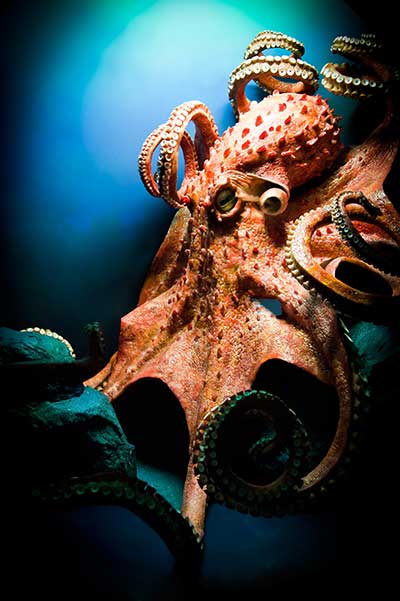
While most cephalopods have some form of an inner or outer shell, the octopus manages just fine without it. Furthermore, others often have arms or other appendages in addition to their tentacles. Instead, the octopus only uses its eight highly developed tentacles lined with suction cups to navigate its world. These iconic tentacles can be used to move, hunt, eat, mate, and even taste.
The different species of octopuses have a wide range of sizes. The Pygmy octopus is as small as 2.5 centimeters and weighs about 1 gram while at least one giant pacific octopus (enteroctopus dofleini) has been recorded as having a 30-foot arm span and weighing 600 pounds.
Octopuses are also invertebrates meaning they have no bones, their bodies made up of and protected by powerful muscle and durable tissue. Moreover, instead of hiding all its organs behind a cage of ribs and a spinal column, the octopus has everything stored in its mantle which is the bulbous, balloon-like part of its head.
Also, within the mantle is the famous funnel or siphon which acts as a pathway for water. It assists in breathing, locomotion, and defense. They are also equipped with a beak that protrudes from their mouth. This is used both as a tooth and as a tool for breaking into clams and mussels.
Speaking of defense, it would be normal to think that a creature with no body bones, or shells, would be capable of surviving long. Nevertheless, an octopus is a formidable if not terrifying opponent to encounter.
First and foremost, they will avoid any danger if they can. The first line of defense is their absolutely incredible camouflage abilities. In less than a second, an octopus can change its appearance on a wide spectrum of colors and textures. In the unlikely event that they are found, they can immediately expel a cloud of ink to distract their opponent.
Furthermore, a compound in the ink called tyrosinase is known to cause smell blindness which can disable a predator’s ability to pursue. After inking, the octopus can use its siphon to shoot off with jet propulsion at 40 km/h – 25 miles per hour and in any direction. Octopuses can also use their camouflage and mimicry to put on threatening displays and even morph into the shape of an animal that would horrify its predators like the Mimic octopus.
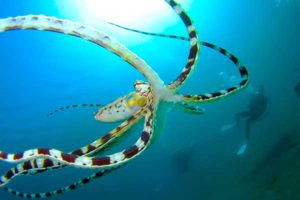 If that wasn’t enough, they can rip off their own limbs and use them as a distraction before escaping and regenerating. If all else fails, they are formidable wrestlers with extremely strong limbs. The muscles have been known to grapple with sharks and even break plexiglass.
If that wasn’t enough, they can rip off their own limbs and use them as a distraction before escaping and regenerating. If all else fails, they are formidable wrestlers with extremely strong limbs. The muscles have been known to grapple with sharks and even break plexiglass.
Beneath all that is a powerful mouth and beak that can inject venom when needed. As an added and truly epic bonus, the male Pillow octopus has been observed ripping off the poisonous tentacle of a Portuguese man-of-war jellyfish and using it as a sword against attackers, kinda cool right?
The Octopus amazing features – How Do Octopuses Work?
To go a little deeper, it’s worth understanding some of the more amazing features of how octopuses actually function. Let’s begin with the heart, or in the octopuses’ case, hearts. They have three. One heart circulates blood around the body while two extras work to pump oxygen-rich blood through the gills. Octopuses need these hearts because its blood is less efficient at carrying oxygen.
They help to keep blood pressure up and oxygen flowing. Even stranger, an octopus has blue blood. The blood contains hemocyanin which contains copper and binds oxygen to keep the octopus alive. The copper-rich hemocyanin appears blue while our iron-rich hemoglobin turns our blood red.
As previously stated, an octopus’ vital organs are all contained in its mantle. It has a brain that is comparable in size to birds and mammals and frequently demonstrates a high compacity for organization, intelligence, and even personality.
That said most of an octopus’ nerves are found in its tentacles. As such, research is showing that while the brain may give out orders, each tentacle has its own separate nervous system that can decide on the specifics of how to complete an allotted task. This is incredibly efficient because it means the brain can delegate to the limbs and then focus on something else.
An octopus’ eye is no less complex. Like a human’s, it has a pupil, retina, iris, and lens. Their eyes are so advanced that they are superb at spotting prey and can reach out and grab with amazing accuracy. The lens of an Octopus’ eye has 8 layers of varying densities that help to bend and focus light dynamically. This gives it its superb depth perception. Their eyes focus so well and efficiently that many modern camera lenses are modeled after their structure.
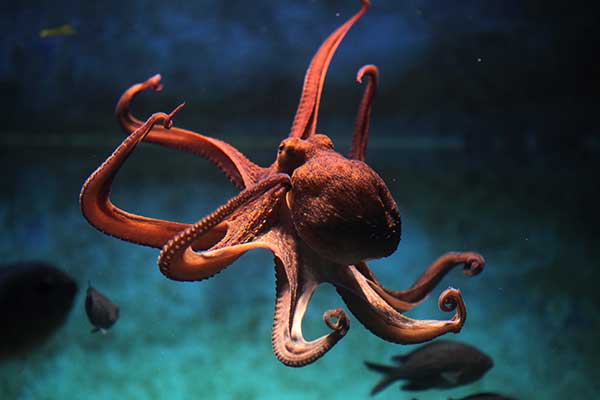 The ability for near-perfect camouflage is also due to the amazing bodily anatomy of the octopus. In order to change color and texture, the octopus utilizes chromatophores, which are tiny pigmentated cells containing sacs of various colors.
The ability for near-perfect camouflage is also due to the amazing bodily anatomy of the octopus. In order to change color and texture, the octopus utilizes chromatophores, which are tiny pigmentated cells containing sacs of various colors.
There are tens of thousands of these cells spread out across the body of the octopus. As it flexes and relaxes its muscles, the octopus changes the pigments of the chromatophores to fit its surroundings.
Every single chromatophore can be individually controlled and activated in less than a second. This gives the octopus almost infinite possibilities for camouflage. In addition to the chromatophores, Octopuses also have iridophores which add a level of nuance to the camouflage by reflecting the colors and textures of their surroundings.
To add even more to texture, tiny projections called papillae are spread across the skin and heighten the ability to blend with course materials like coral and sand.
When it is time to mate, octopuses undergo a brutal and tragic ritual. First, a male octopus finds a mate. The female octopus is around 100x its size. This is the equivalent of a beetle dating an adult woman. A male octopus has an arm called the hectocotylus which is lined with pockets of sperm. When it has found its giant love, it either rips the hectocotylus off and hands it over for later use or inserts it into her oviduct. After this, the male will wander off to end his short life. The female then finds a safe space to lay her eggs.
If she is carrying the hectocotylus, she will wave it over eggs like a wand and fertilize them. For anywhere between 2 to 10 months, the female will guard, clean, and care for her eggs without eating. Once the eggs hatch, their mother soon dies, and they are left on their own. While very little is known about the early life of an octopus, it is estimated that a baby giant Pacific octopus has a 1% survival rate from hatchling to ten millimeters. If they do survive, they can expect an average life span of 3 to 5 years, growing at about 5% of their body weight each day.
Read Or Listen To The Article Click Here.Octopus Defenses
Conclusion:
Few animals on the planet are as iconic or as fascinating as the octopus. Since the beginning, they have occupied every facet of our lives in some form or another. In myth, their strength and intelligence represented our greatest fears of the unknown depths of the sea. They are ubiquitous in our culture as symbols of everything from the beauty of the ocean, villainy, conspiracy, and even erotica. In science, they are marvels in the structure of their bodies and the potent activity of their brains.
Their distinct personalities and forms of expression amazes and inspires researchers. An Octopus by the name of Otto actively communicated boredom by juggling hermit crabs, throwing rocks and rearranging the decorations of his tank.
When he was truly upset, he learned to squirt water out of his tank and onto to the aquarium lights which would then short-circuit the lighting of the entire building. At Millersville University, an octopus expressed her discontent with the quality of her meals by waiting for the researcher to return to the room. When they did, she would make direct eye contact while shoving her stale food down the drain.
There are many examples of octopuses escaping their tank.
It is perhaps those stories that should amaze us the most. Octopuses are more than just another animal to be studied, they are true individuals who learn and are able to communicate with us. Gone are the days when we might live in terror of a suckered tentacle pulling us under the sea. Today, the octopus is a species we can not only learn from but can connect within a beautiful and profound way.
Read Or Listen To The Article Click Here.Octopus Anatomy
Do you want to know more about different octopus species?
Atlantic Pygmy Octopus Read Or Listen To The Article Click Here.
Blue Ringed Octopus Read Or Listen To The Article Click Here.
California Two-Spot Octopus Read Or Listen To The Article Click Here.
Caribbean Reef Octopus Read Or Listen To The Article Click Here.
East Pacific Red Octopus Read Or Listen To The Article Click Here.
Mimic Octopus Read Or Listen To The Article Click Here.
Large Octopus Vulgaris Read Or Listen To The Article Click Here.
North Pacific Giant Octopus Read Or Listen To The Article Click Here.
Seven-Arm Octopus Read Or Listen To The Article Click Here.
References:
//en.wikipedia.org/wiki/Octopus
//www.peta.org/features/5-times-octopuses-made-headlines/
//en.m.wikipedia.org/wiki/Kraken
//dreamingandsleeping.com/octopus-spirit-animal-symbolism-and-meaning/
//animals.howstuffworks.com/marine-life/octopus.htm
//digitallibrary.amnh.org/bitstream/handle/2246/6513/NH116n01.pdf?sequence=1&isAllowed=y
Please Support Us.
Do you like Octopusworlds.com?
Please let us know:-)
Rate and Share your favorite Octopus video or story.

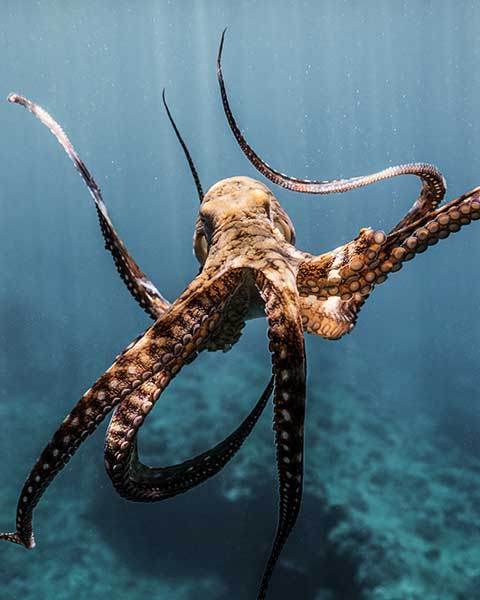
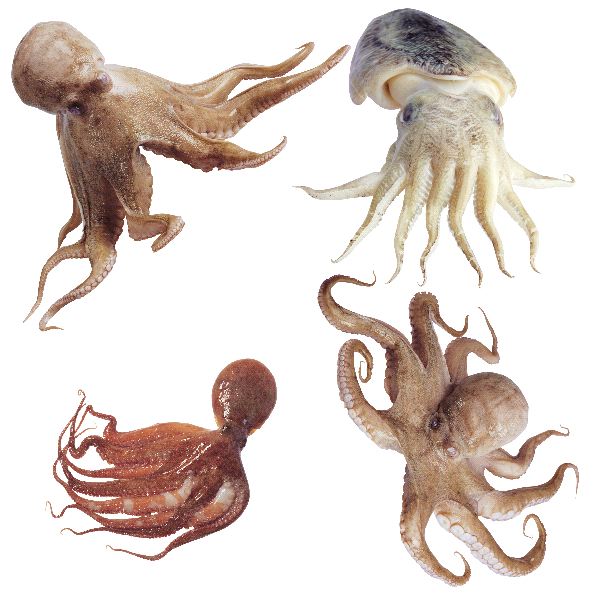



This is some really cool information! Thanks for sharing!
I was always fascinated by Octupi, even from a young age. I watched a National Geographic series with an animated character named Spin (I think it was called Really Wild Animals), that featured some interesting Octopus info.
You named a few I hadn’t heard of. They’re totally wild, aren’t they? One of the most unique creatures from the ocean, and in some ways… a little creepy. They’re actually considered good to eat by some!
I am always awed by the uniqueness of the octopus, they are totally different from other animals and one can say they very predatory. I watched a programme on National geography channel that showed the octopus having a serious bite technique. Learning more about their personality and intelligence in your post is awesome, I think maybe in the future, research will go on to try to communicate with them
Thanks for this comprehensive article. I watched a video on Facebook yesterday of an Octopus running from danger. First he changed color to black, sort of like a warning to back off, and then he camouflaged in with the surroundings. Before that video I had no idea that this was even possible but it’s made me interested in the species even more, and your article has given so much insight into the Octopus. Thanks a bunch. I learnt a lot :)
My 10 year old son has an inexplicable passion for octopus. Navingado together on the web we came across this post and he is literally crazy. The site immediately entered the favorites folder and consults it every day. The graphics, images and quality of information are of a higher level. Thanks again for sharing your knowledge.
Wow awesome and insightful post! Octopuses are fascinating animals to observe and study. They are very unusual invertebrates and are an important part of their ecosystem. It’s interesting and educational to learn about their lives and behavior. I should share this to some group of friends, that I know will appreciate it more!
Regards.
Am not a big fun of octopus but you article was very informative, I had no idea there were so many species. Nice use of visuals.
Thanks, Jordan I take it all:-) If you would go an give the article a star rating, I will be very grateful.
Hi, Henderson and thanks for the comment. Please give the article a star rating at the bottom of the page. Thanks again and have a nice weekend soon:-))
WOW!!
This is the most interesting post i have read on an animal and i did not know that octupuses are such a magnificient animal.
I am still wowed by the amount of thing i have learn while reading this post!
Who knew Octupus had a personality!? and the Kracken? I enjoyed that bit of trivial also.
Definitely showing off to my friends with this knowledge before i point them at the post!
Thanks i enjoyed reading this a lot
Head footed is indeed a perfect description of an octopus. I have never seen one myself, (other than on TV and books, and articles like this one). But I kind of get chills by the thought of seeing one. Not to talk about the protruding eyes!
Those are really interesting facts about the octopus. Their ability to camouflage and dispel ink is so amazing! Almost supernatural! Rip off their own limbs? Whaat? Strange indeed that an octopus has blue blood. More strange is the size of a female octopus.
Thank you for taking your time to give us such a breath taking article. So many interesting facts!
Hello! I read this post and it was interesting. To be honest, I’m always awed by the unique features of an octopus. They are a unique animal with unconventional constituents. Yeah! That reminds me of the documentary I watched about an octopus sometimes back showing how they attack with their unique biting technique. Though your post major on giving insights as to the intelligence and great personality of the animal is sweet and definitely I have enlightened myself through this post.
This is very interesting information about octopuses. I didn’t realize how smart they were. My son loves octopuses so I’m sure he will love all of this great new information. The part about them stealing crab off boats is particularly interesting to me. Thank you for such an informative article.
Thank you for this great article. I have always been fond of the octopus. You have created a very in depth article here. I like how you can read or listen to the other articles too.
Octopus are so smart. They have all these great cloaking features. I have seen an octopus outsmart a shark. I have even seen octopus fit into a bottle. Also they are cool looking!
I hope when people try to look up info on the octopus, this is the page they find. I gave you five stars!
Wow, iconic indeed. I’ve often fantasize about this creature and its uniqueness is outrageous . I have read quite a number of article about an octopus but non seem to have perfectly give a detailed description as the one in this wonderful post. I look forward to learning more about this creature and would definitely share the knowledge gained from this post.
Hi.
It was nice to read your post which was about Octopus. You have provided so many information about Octopus and able us to learn more about it. I really did’t have much idea as you provided about Octopus. You have nicely described about what octopus is, how it look like, how it works. about it’s intelligence, personality, an overview of octopus and human culture and so on. I really have known many unknown information about octopus.
Your post was really amazing to read and I will share your post to others. Thank you so much.
Reading this article reminds me of my high school biology class…on the topic of taxonomy I remember when we’re given real octopus to draw and label the most relevant features they can’t survive without in their habitat. It’s been a long time now so some of the things you’ve provided here bring those memories to live whiles other features pointed out makes me feel like I didn’t study about octopus in school.
I guess my engineering interest has buried them but I’m glad to learn some new things here….octopuses have three hearts. That’s really a new thing for me. It’s amazing how they all function to ensure the survival of this animal. Thanks for the information.
Beautiful added knowledge for me, The octopus Amazing Features are truly amazing, I learned they have 3 hearts, they have huge brains and has blue blood It’s a mollusk, phylum that includes clams snails, slugs, squids and snails. it has 8 tentacles, all supported under the bulbous, balloon-like part of the head. it has a break that protrudes from its mouth. Their personality is not an aggressor they avoid danger, hide from their various colors of phores. They have highly developed eyesight that could sport prey from afar and ability to pursue successfully, Afterall they have 8 lenses! giving them extra depth perception. The male mate with 100x their size female and rip off their rm filled with sperms leaving them with femal. They could also even ripped off their own limbs if they need to. They have their own personality and has high intelligence. Mind-boggling information. Thanks.
Excellent article,kudos to your efforts in writing about the amazing features of Octopus,to be realistic, its amazing character indeed,I’ve not come across or read about any animal of such a size with that great features and capabilities,the feature of changing to the environment to deceive the predator is powerful and awesome,I can say this article worth reading,and very educative to me and I know many people also must have learned immensely from it,thank you for sharing it.
As you say, the octopus is a fascinating creature. I’m in the UK and I don’t think that we have them around our shores but the legend of the Kraken in the North Sea means that maybe we do, or maybe we did at some point in the past. Obviously, they exist further south around Spain and in the Mediterranean. Are they endangered anywhere? I would assume yes as us humans have a horrible habit of catching so many of something it becomes extinct. This is a fascinating article, full of beautiful images.
Thanks for this educating and awesome review. I have always heard about the uniqueness of the octopus but I have never had time to go through it characteristics. This is an awesome predator with interesting features that can’t be overlooked. I have always loved animals with extra or different features beyond the normal. Do they come in different colours as seen in many pictures ? Thanks for this great review,I feel amazing for knowing these much about Octopus.
This is another interesting post about this wonderful marine creature, octopus. Its features are amazing and it’s also exciting that it has its own personality. As far as I know, a natural scientist was fascinated by an octopus of the Pacific, who also wrote a book about it called “the soul of an octopus”. She also discovered that some of their brain functions are in their tentacles. Consequently, it is about creatures with intelligence and developed intelligence.
Thanks for the information you shared with us and for your very well-updated article.
Hello there! This post could not be written any better! Reading through this post reminds me of my good old room mate!
He always kept chatting about this. I will forward this post to him.
Fairly certain he will have a good read.
Many thanks for sharing!
I think other site proprietors should take this website as an model, very clean and great user genial style and design, let alone the content. You’re an expert in this topic!
I wanted to thank you for this fantastic read!! I definitely enjoyed every bit of it. I’ve got you bookmarked to look at new stuff you
thanks im in class
Good post. I learn something new and challenging on sites I
StumbleUpon every day. It will always be helpful to read content from other authors and use a
little something from their web sites
“I visited multiple sites however the audio quality for audio songs present at
this website is really fabulous.”
Hey There. I discovered your weblog the use of msn. That is a
very neatly written article. I will be sure to bookmark it and
return to learn extra of your helpful information. Thank you
for the post. I will definitely comeback.